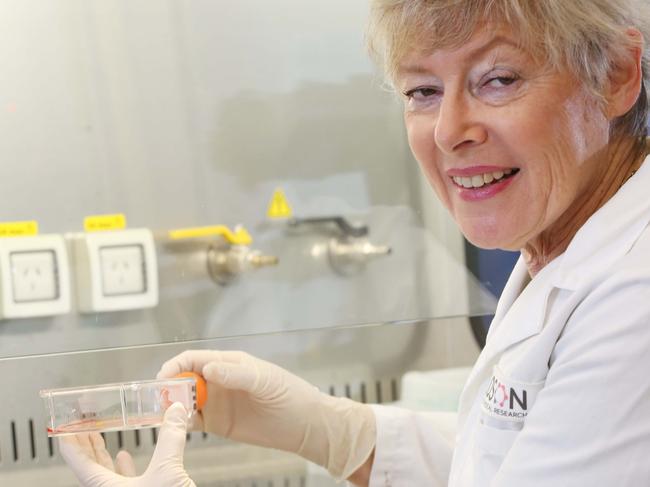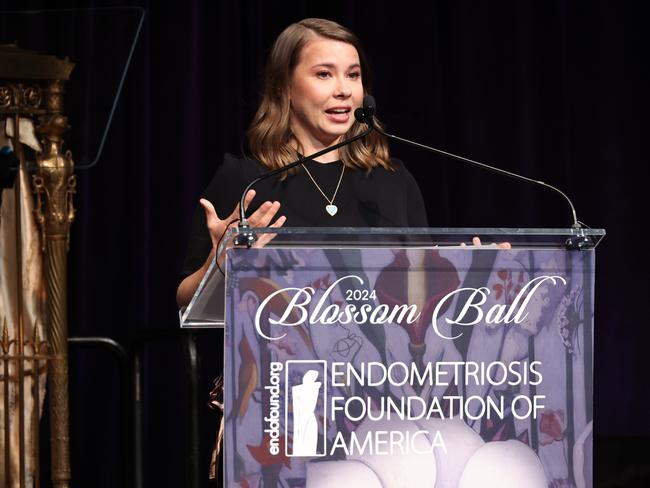Scientists find clues to endo diagnosis, and it is all in the blood
A pioneering fluid biobank could hold the key to earlier and easier diagnosis of endometriosis, a debilitating condition impacting close to one million Australian women.
Victoria
Don't miss out on the headlines from Victoria. Followed categories will be added to My News.
The answer to a simple test and better treatments for endometriosis may lie within women themselves.
One of the country’s top endometrial stem cell scientists is pioneering a menstrual fluid biobank which she believes holds the key to earlier and easier diagnosis of the painful condition affecting more than one in seven women.
Speaking at the Victorian Pelvic Pain Symposium in Melbourne on Thursday, Professor Caroline Gargett said the Australian Menstrual Fluid Biobank for Endometriosis Research (AMBER) would store endometrial stem cells and other components from menstrual fluid donated by Victorian women.
“It contains endometrial tissue and provides a non-invasive way of obtaining this tissue,” Prof Gargett said. “We want to develop a diagnostic test for endometriosis based on its cellular, protein or molecular components.”

She said there was still a way to go to pinpoint the causes of endometriosis. “But AMBER is really quite exciting with unlimited potential for determining if chronic pelvic pain is due to endometriosis or other causes in a non-invasive manner.”
The goal, Prof Gargett said, would be to use a woman’s own menstrual fluid to determine the presence of endometriosis in quick and easy pathology rather than a blood test because menstrual fluid contains endometrial tissue which shows differences in women with endometriosis.
This would save millions of women undergoing surgery, the only method now to give a definitive diagnosis of the debilitating disease. It would also reduce the time it takes for women to get a diagnosis, which on average is seven to 10 years.
Endometriosis is a painful and chronic condition characterised as tissue similar to the lining of the womb growing in other parts of the body.
Prof Gargett, who heads the Endometrial Stem Cell Biology lab at the Hudson Institute, is a global research leader.
She is looking for funding for AMBER which she believes can also be used to evaluate and monitor other endometrial disorders.
Her plans are to process menstrual fluid into organoids (3D endometrial cell cultures) that could be used as models to assess current hormonal treatments or groundbreaking treatments for endometriosis and for other gynaecological disorders.

She said the biobank would focus on processing menstrual fluid to five components offering scientists globally basic research opportunities.
The team is already working on a 3D menstrual fluid organoid model to personalise endometriosis treatment which could also be used in new ways to diagnose and treat the cause of polycystic ovary syndrome (PCOS), a complex hormonal condition also associated with irregular or heavy menstrual cycles.
“We also believe menstrual fluid may help diagnose infertility caused by endometriosis and we are investigating the immune cells found in menstrual fluid to learn more about immune responses.
“The potential of this AMBER biobank is unlimited.”

Her team has also created scaffolds made with non-degradable and biodegradable polymers to treat pelvic organ prolapse (POP), a condition suffered by many women following childbirth requiring one in five to undergo surgery in their lifetime.
“This is a taboo topic for many,” she said, adding that had to change. “I was shocked by the number of women impacted.”
With her team Prof Gargett has also developed pre-clinical models of POP and vaginal birth injury to evaluate the scaffolds and hydrogels with endometrial mesenchymal stem cells and is now working with Dr Shayanti Mukherjee toward translating the team’s findings into the clinic.
Dr Mukherjee is developing 3D printed novel degradable scaffolds onto which they bioprint endometrial mesenchymal stem cells as a potential treatment for pelvic organ prolapse.
The Victorian Pelvic Pain Symposium was presented by the Victorian Government with the Royal Australian College of General Practitioners.
Health Minister Mary-Anne Thomas said it was an incredible opportunity to gather 300 of Victoria’s leading physicians and sector advocates together, all in the spirit of delivering better health outcomes for Victorian women and girls.
LEARN MORE
Prof Gargett will discuss endometriosis and Dr Mukherjee will talk about pelvic organ prolapse at a free public webinar on Thursday 27 June 2024, run by the National Stem Cell Foundation.
To register visit: https://events.humanitix.com/future-medicine-stem-cells-and-women-s-health




